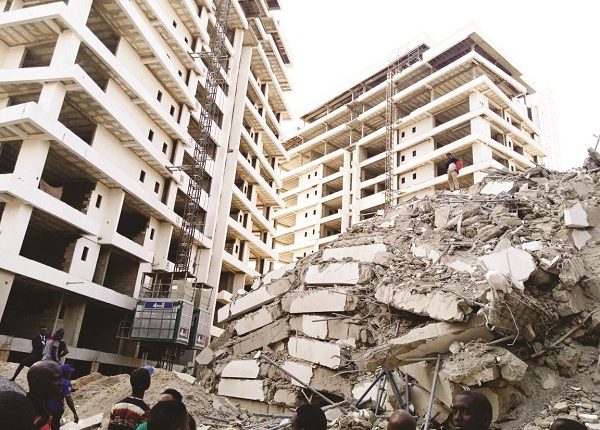In the Lagos State real estate market, Ikoyi quickly comes to mind as the apex of Nigerian residential real estate. Dotting the skyline and landscape are Luxury developments, the prices of which constitute the highest entry point to any real estate market in Nigeria.
It was indeed a sad surprise that a 21-storey block of residential apartments, Gerard Road, Ikoyi, Lagos, the third in a set of three, collapsed on the 1st of November, 2021. The construction, which was targeted to finish in 2022, was already at 80% completion and priced between $1.2M and $5M per unit. It was 65% sold out. According to authorities, the project was not insured as required by the Lagos State Physical Planning Permit Authority (LAPPPA) meaning that compensation for the victims and subscribers will be a very difficult task.
According to reports, a lack of concrete cube test results for each stage of construction meant that Prowess Engineering, the engineering firm initially involved in the project could no longer guarantee the building’s integrity and subsequently pulled out of the project. Again, the original approvals for the structure were originally for 8 floors. This would later be changed to 15 and finally, 21 throwing caution to the wind and the initial calculations supporting the structural integrity of the building out of the window.
Read Also: Uneasy Calm in Warri Kingdom Over Unsubstantiated rumours
The steep decline in the currency’s exchange value also meant that building materials would have become more expensive as the project progressed and it’s nothing to be unexpected in the Nigerian construction industry. The unanswered question, therefore, remains – what compromises were made that led to the devastating collapse?
Since the collapse last year, the demolition of the other two high-rise buildings adjacent to the collapsed 21-story skyscraper has not been ordered by the authorities. While there have been other building collapses in Nigeria over the years, one in an exclusive neighbourhood as Ikoyi, which would normally be home to the highest-end buildings, should represent a turning point in the sector. Outcomes expected immediately by experts were:
(1) Changes in demand in the local real estate market. Location, price, and finish have traditionally trumped quality and even size in real estate demand. With the collapse, a shift in demand for quality was expected. However, due to economic realities, low-grade real estate items continue to be in high demand.
(2) Changes in supply in the local real estate market. The collapse raised questions about both new and existing real estate assets. In the short term, structural integrity tests were supposed to become commonplace and structural integrity given more emphasis in general. The winners will be the construction businesses and developers already known for high quality, who will be able to charge more for the quality assurance they provide.
(3) A variant of this case for stricter regulatory compliance will be self-imposed enforcement by construction and real estate professionals. This is what may foster longer lasting change.
On the part of the government, major changes in the regulation of construction and real estate industry which could play out in stricter regulations enforced for property development for a short period – and then business continues as usual in the long run were expected.
Also, a review of practice qualifications for construction and real estate professionals by the various regulatory associations with stricter regulation and enforcement was expected immediately but about 7 months later, everyone seems to be silent and everything continues as usual.





